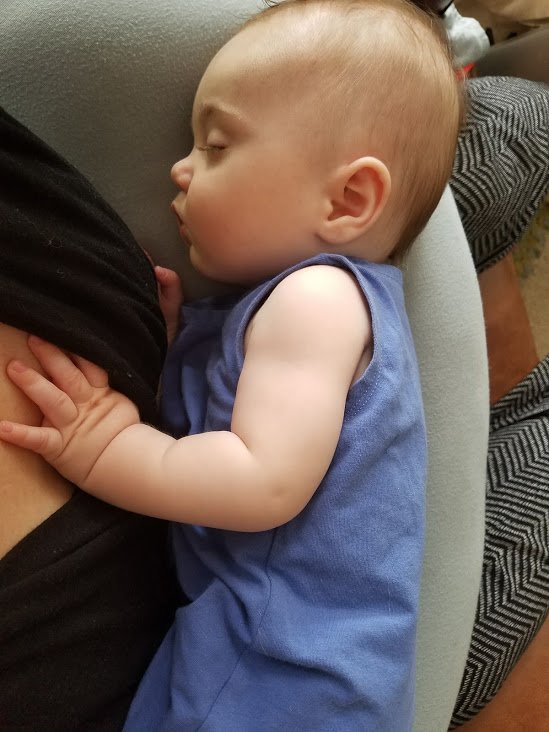Let's Tell Your Story
Meghan and Asher
Before I actually went into labor, I joked that my biggest fear was the part where they hand you the baby and send you on your way, and suddenly you are solely responsible for a tiny, helpless new person.
All the rest, I thought I would take as it came. Drugs during labor? We’ll see how it goes! Breastfeeding? We’ll try, and hope it works out. C-section? Let’s try to avoid that, but if it happens, it happens.
It didn’t take long for this zen acceptance to be exposed as a sham. I had a long and difficult labor, which ended in an unplanned c-section after 3+ hours of pushing. Asher was face-to-the-side, hands up, and definitely not coming out the old fashioned way. When the OB looked at me and said, “You can push all night, but this is never going to work,” I was devastated. It turned out that I really did feel strongly about having a natural labor, but I didn’t realize it until I knew it was 100% not happening.
That was strike one.
Asher was born just after midnight on February 2nd, and at first latched like a champ. I felt vaguely victorious, like I was showing my body who was boss after its total failure in the labor department. But one circumcision and a sleepy day later, my nipples were bleeding and Asher’s latch was falling apart. Soon a nurse was pressing formula and a pump into my hands in the middle of the night, explaining my baby had lost too much weight and needed supplementation.
Strike two.
I burst into tears in my hospital room, suddenly desperate to be able to say my son was exclusively breastfed and feeling like a failure. The nurse was sympathetic but unyielding, and my husband fed the baby formula from a tiny cup while I pumped. Things didn’t exactly improve from there: I ended up with an incision infection, a few follow-up surgeries, and a supply that wasn’t keeping up – Strike three.
We embarked on a schedule of breastfeeding, pumping, and supplementing. Every time I mixed a bottle of formula, I felt shame. Despite all my pre-baby declarations, I had internalized the idea that breast was best, that formula was bad, that breastfeeding was the only way to bond with my baby. My body had let me down, and in turn I was letting my baby down.
But of course, none of that is true. The lactation consultant I called in in a last-ditch effort to “fix” my breastfeeding relationship brought me back to my sense. She reminded me that it doesn’t have to be all or nothing. Breastfeed as much as you can or want to, but the real mantra to internalize is fed is best. I worried that using formula would mean I’d lose my meager supply and have to give up breastfeeding. It didn’t. For several months of my maternity leave, I actually ended up going exclusively to the breast. I worried that feeding from a bottle wouldn’t feel like bonding. But he looks at me with the same happiness and appreciation no matter what or how he’s eating.
Asher turned six months old this month. He’s a happy, inquisitive baby. When people meet him, they ask about his baby mohawk (born with it), or his blue eyes (mine) -- no one ever asks how he’s fed, because it really and truly doesn’t matter. Breastfeeding can be an amazing and joyful experience, a painful nightmare, or some mix of both -- but at the end of the day, it’s just one way to feed a baby. So whether you’re all breast, all formula, or some combination of both, you’re rocking the most important part: keeping that tiny, helpless new person happy, healthy, and fed. Period.



